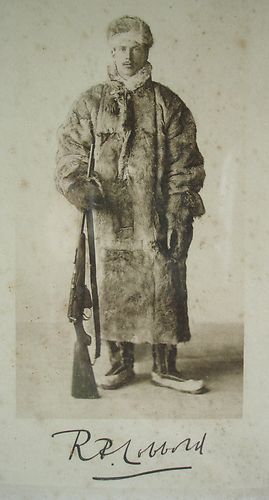WARREN COUNTY FARMER MAROONED IN ARCTIC AS YOUNG MAN
Only a select few individuals ever visit the Oval Office, but those who do have the rare opportunity to view the Resolute Desk, presented to President Rutherford B. Hayes by Queen Victoria in 1880. More than a quarter century prior to that year, a future Warren County farmer was rescued by the Resolute, the ship which furnished the timbers from which the desk was crafted. That man was presented with a medal by Parliament for his part in a celebrated arctic rescue mission, during which the Northwest Passage was formally mapped for Great Britain.
John Calder, whose death occurred at Alexis, Ill., on Jan. 8, 1905, was born in Sommetshire, England, in 1819. At the age of 14 he was apprenticed to a butcher, then went to London, where he pursued that trade.
In the spring of 1840 Calder shipped to South Australia, then boarded a vessel for China, where he remained 18 months. He then sailed to India, where he lived for six months, before returning to England. In 1846, he began a three-year tour of South America, visiting such cities as Montevideo, Buenos Aires and Rio de Janeiro.
After returning to England, Calder in 1848 joined an expedition to the arctic to search for the missing party of the famous explorer Sir John Franklin, whose ships had disappeared in search of the Northwest Passage. Sailing on the H.M.S. Investigator, the yearlong mission failed to locate the Franklin party, which had in fact perished the year before, due largely to lead poisoning from solder in the canned food aboard their vessels.
Pressure by Franklin’s wife to rescue her famous husband caused the Admiralty to immediately launch another expedition entering the Northwest Passage from the west, rather than the east. In 1850, Calder again sailed on the Investigator as captain of the forecastle. With seasoned captain Robert McClure at the helm, the Investigator was accompanied by a sister ship, the Enterprise, but the ships were separated in the Straits of Magellan, and never reunited.
The Investigator traveled to Hawaii, and then Alaska, before entering the Arctic Ocean, where it passed the winter on Princess Iles in the Prince of Wales straits and the temperature plunged to negative 66 degrees. In the spring of 1851, it tried to travel north, but was caught permanently in ice floes.
During that summer, crew members crossed the ice to Melville Island, where they deposited papers that would lead to their eventual discovery and rescue. The following winter was brutal and many of the crew developed scurvy. The following spring, they were about to abandon ship when they were found by the men of the Resolute and the Intrepid, who had been sent out to search for them.
Soon, those ships were also caught in the ice and the crew was marooned during the winter of 1853-54. In the spring, the men set off on foot along Beechey Island, where the Franklin expedition had spent its first winter and where three crew members were buried. Here they came upon a vessel called the North Star, which returned them to England.
Calder participated in the distribution of $5,000 pounds sterling to the 59 survivors of the expedition. He was also given two medals for distinguished service to the crown.
In 1855, Calder married Miss Fannie Cattle and shortly thereafter the couple sailed to America, where they settled in Chicago. Failing health caused Calder to leave the city in 1863 and come to Warren County, where he purchased farmland in Kelly Township and engaged in a successful stock raising business.
In the winter of 1891, a reporter for the Chicago Tribune made his way to Calder’s farm home, near Alexis, and found him seated comfortably before a bright fire. He had heard that Calder was likely the last surviving member of the 1850 arctic rescue mission.
“It’s pretty cold,” said Calder, as he asked the reporter to join him, to which the reporter replied, “Not for a man who started out in earnest to find the North Pole, is it?”
“Oh, that was 40 years ago,” said Calder, “and I have forgotten nearly all about it.”
Additional passages from the Tribune interview offer insight into Calder’s experiences. Here is his recounting of how he came to sail on the ill-fated expedition:
I didn’t hear a word regarding the sailing of the Investigator until just the day before she started. I (saw) a friend on the street who told me he had read in a London paper that another expedition in search of Franklin was about to leave. I went to London that night and found the ship next day at Woolwich. I shipped as Captain of the forecastle. We had everything that was supposed to be necessary for our comfort and convenience. We were well supplied with rations, clothing, and fuel. I remember one man, who had never been in the Artic regions asked me what he should take with him. I replied: ‘All the moral courage you can get hold of.’ Next to food and raiment this is what a man needs most.
He also describes the challenges of living in extreme cold:
A peculiar feature of Arctic life is the discomfiture one feels sleeping in the ship after having been out on a land expedition and having spent many nights on the ice. It is caused by the difference in the atmosphere. It is pretty airy sleeping under a canvas tent when the thermometer registers 60° below zero. The coldest I ever saw was 66° below zero…
Calder said he had cut holes in his boots to let the water through which he was traveling flow through and not freeze around his feet.
In later years, Calder retired to the village of Alexis. At the age of 86, he traveled to Eureka Springs, Ark., for his health, but the doctors there told him there was no help for him and he returned to Alexis. Two days later, he died. He is buried in Alexis Cemetery.
The ship Resolute was found adrift by an American whaling ship in 1855, 1,200 miles from where it had been abandoned. It was restored and purchased by Congress for $40,000. It was then sailed to England and presented to Queen Victoria. After it was retired in 1879, Victoria had the Resolute desk made and presented to the United States in gratitude.
The Investigator, upon which Calder sailed, was discovered in 2010 by a team of Canadian scientists and archaeologists.














